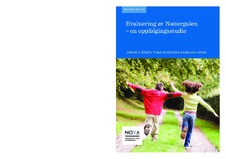| dc.description.abstract | NOVA has completed a follow-up evaluation of the mentor project ‘Nattergalen ’, commissioned by the Directorate of Children, Youth and Families (Bufdir). The project started in 2008, involving eight university colleges/universities in Norway. Nattergalen connects children aged 8-12 years with minority backgrounds, with social work students who are their mentors on a one on one basis during a school year. The daily administration of the project is taken care of by coordinators at each university college/ university. The main objectives of Nattergalen are: 1) To increase cultural sensitivity among child welfare workers by enhancing the students’ knowledge about and gaining experience with children, young people and families with minority backgrounds. 2) To contribute to the improvement of the children’s proficiency in Norwegian, increase their school motivation and to raise their self-esteem and increase their experiences of mastery. The long-term goal is to encourage children and young people with minority backgrounds to graduate from Upper Secondary School and go on to higher education. This study gives a retrospective overview of developments within the project, during the five-year period since it was evaluated in 2011. Our evaluation seeks to examine whether the project has been organized and implemented in accordance with Nattergalen’s objectives. The data used in the study are based on analysis of the annual reports from all the participating university colleges/universities, interviews with the project coordinators and managers at each site, and with contacts at the participating schools. In addition, we have assessed how the mentors have profited by participating in the programme, through questionnaires. A total of 838 children and 838 mentors participated in Nattergalen during the five year trial project. The annual number of participants have varied over the years and between the sites. The main conclusion is that the mentoring program works as intended. The questionnaire to the mentors indicate that the learning effects of the program are beneficial for the children and the students. Approximately four out of ten (36 %) of the children have improved their language skills according to the mentors, and more than fifty percent of the children have improved social skills in 2016-2017. Even though a majority of the children had sufficient language skills to communicate with their mentors from the beginning, the children have obviously had learning outcomes such as enhanced comprehension and expanded their vocabulary. The survey gave several examples of positive changes in the childrens’ social skills: several children became more secure, open and talkative, and subsequently took more initiatives to interact with other children. The interaction with the children was characterized by all-round activities and most of the children (seven out of ten) participated (took part in?) in choosing activities. According to the mentors, the children have enjoyed being in the Nattergalen program and have benefited from the time they spent with the mentor. While spending time with the children, the mentors get practice in communicating with children, increase their knowledge and gain insight about the daily lives of children and families with minority backgrounds. Eight out of ten students say they have improved their communication skills and simultaneously gained insight about the children’s living conditions and quality of life by participating in the mentoring program. The Nattergalen coordinators are responsible for recruiting, training and guiding their mentors, informing and cooperation with the participating schools, in addition to matching mentors with children. The program is vulnerable, because the coordinator’s role depends on the individuals who have it. Also, several pointed out that the resources allotted to do the job are insufficient, a problem that was solved by cooperating with other teachers and /or hire former mentors as co-teachers / assistants on an hourly basis. The Nattergalen program depends on the schools contribution by recruiting children and the schools cooperation in order to function. The cooperation with the schools functions relatively well, but since their contribution is voluntary the program still is dependent of individual commitment and engagement. At five of the educational institutions, Nattergalen has become a topic within bachelor programs in Social Work. The topic (mentoring in a multicultural context) is an addition to the regular study’s curriculum. Also at three of the sites, Nattergalen is part of a voluntary or compulsory practical training period in the bachelor program. Since the previous evaluation study, several educational institutions have, or are going to let students from other fields (teaching, sports, and special education) participate in the program. Although not all have been implemented successfully. This evaluation study indicate that the mentoring program still has limitations due to the lack of formalization at the educational institutions and funding. Even though the Nattergalen program has gained recognition as an additional academic program and also been technically adapted in most of the institutions, there has been some reluctance to integrate the mentoring program into the ordinary degree programs. The challenge for Nattergalen is to strengthen the organizational and professional ties with the educational institutions. The overall responsibility for securing the program’s robustness and legitimacy of the program should be placed with the institutions’ management. There have been several attempts to extend the program to other target groups and other fields of study, but none have yet been implemented as permanent schemes. One reason might be the program’s current professional and financial limitations. One measure that might enhance further development of Nattergalen and stimulate expansion of the program, could be to establish a financial scheme to fund development of new mentoring programs. | en |
